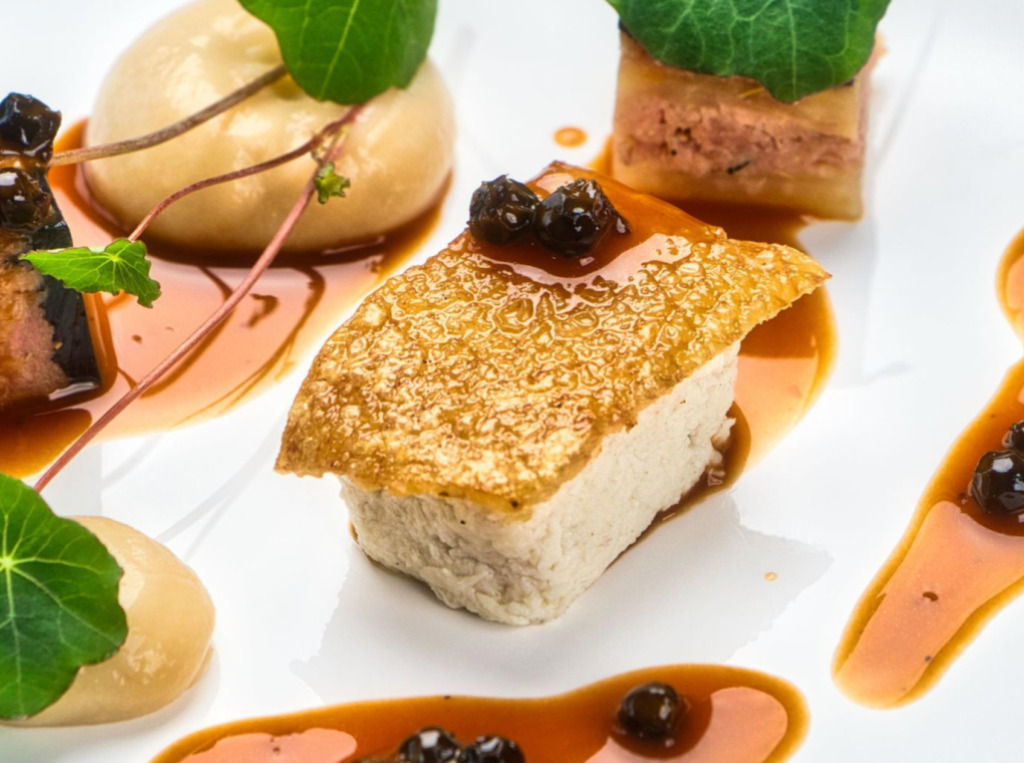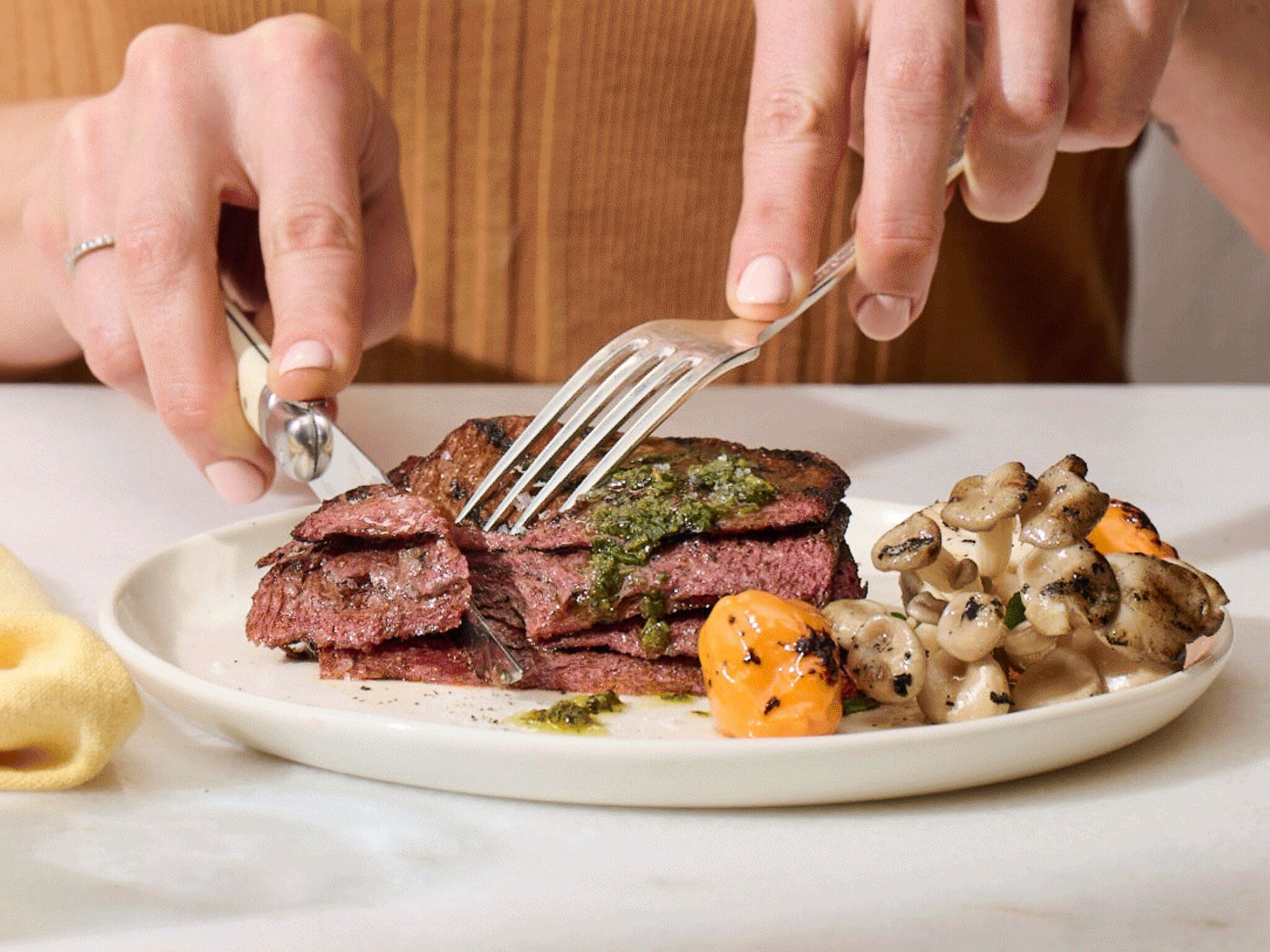Cultivated Meat Regulation: Where Are We? UK, Israel & Australia Forge Ahead, US & EU Fall Behind
12 Mins Read
With 2024 tipped to be a landmark year for cultivated meat regulation, we look at how the industry is faring across the world.
While some countries are stepping up their efforts to progress these novel foods, others are pushing to ban them altogether.
After a year that broke a three-year-long regulatory deadlock for cultured meat – with the USDA approving the sale of Upside Foods and Eat Just’s cell-based chicken – we’re not even a month into the new year, and we already have a third company on the list.
Just last week, Israel’s Aleph Farms became the world’s first producer to gain clearance to sell cultivated beef, after receiving a ‘no questions’ letter from the country’s health ministry. For many, it’s a marker of things to come for the industry this year, proving that there will likely be no further deadlocks – at least from a global perspective.
Yifat Gavriel, Aleph Farms’ regulatory affairs chief, said after the approval: “2024 stands to be a landmark year for the advancement of regulatory pathways and commercialisation of cultivated meat.”
So let’s look at how things currently stand. Some countries are really accelerating their efforts to advance cultivated meat regulation, while others are going completely in the opposite direction as legislators hope to ban the production and sale of these proteins. Here’s what’s happening.
Forging ahead: Israel, UK and Asia-Pacific

Let’s start with the good. In December, Israel’s Ministry of Health issued a ‘no questions’ letter for Aleph Farms’ consumer brand Aleph Cuts, allowing it to market its cell-cultured beef steak in the country. The approval for Aleph Farms’ Black Angus Petit Steak is subject to meeting labelling and marketing requirements as well as the completion of a Good Manufacturing Practices inspection on its facility.
It made Israel the third country – after Singapore and the US – to clear the sale of cultivated meat, advancing efforts to tackle food insecurity. The country has always been supportive of alternative proteins. “Three out of the first eight cultivated meat companies worldwide are Israeli. 15% of global investments in the field are allocated to Israeli-cultivated meat companies,” explained Alla Voldman, VP of strategy and policy at GFI Israel.
“With its global leadership in cellular agriculture, Israel continues to push for greater regional integration and economic collaboration, which will be crucial for stabilising the region,” added Aleph Farms co-founder and CEO Didier Toubia.
But it isn’t just Israel that Aleph Farms applied for approval in – it has done so in Singapore, the US, Switzerland, and the UK. The latter, which is home to at least 23 cultivated meat startups, is reportedly aiming to fast-track its approval of cultured meat via a bilateral deal with Israel. While it currently retains pre-Brexit rules and follows the EU’s stringent novel foods process, the UK’s cultivated meat sector is growing fast – British startups raised £61M in funding in 2022, which is more than the rest of Europe combined (£45M).
Now, UK ministers and regulators are looking to accelerate the approval of cultivated meat to boost food security, ease the cost of living, and provide alternative, planet-friendly meat sources for a growing population. They intend to do so through a deal with Israel to boost collaboration on cultured meat, with the British stakeholders visiting Israel in 2023 to taste these novel proteins and see how the market is regulated.
In light of this, the country’s Food Standards Agency recently launched a survey asking manufacturers when they plan to applications for cultured products, and what technologies they may be using.
Meanwhile, there is positive progress in Australia and New Zealand too: the countries’ joint regulator greenlit Sydney-based Vow Food’s cultured quail as ‘safe to eat’ in December. It gave way to a six-week public consultation process, giving people an opportunity to provide feedback about the product. Following the comment stage, the regulator will continue the novel food approval process, with an aim to complete it between March and May.
“Public confidence around the introduction of novel food categories is always a vital step in gaining acceptance,” said Simon Eassom, executive director of Food Frontier. “The ultimate success of Vow’s application will pave the way for Australia and New Zealand to take a lead in this exciting new era of food production.”
Cultivating potential: Regulatory opportunities in Asia-Pacific

Another Australian producer, Magic Valley, recently revealed that it’s working closely with the Antipodean regulator on the compliance and safety of its cultivated pork, with approval anticipated this year followed by a 2025 commercial launch.
Elsewhere, France’s Vital Meat claims it’s the frontrunner to become the first European startup to be approved in Singapore, the first country to approve the commercial sale of cultured meat. It will likely face competition from Dutch cultured pork producer Meatable, which is also expecting approval this year.
Chinese and American regulators met virtually last year after Upside Foods was granted Generally Recognized as Safe (GRAS) by the FDA to discuss how the industry can move forward. A month later, the annual, China’s Central No. 1 Document mentioned a diversified food system of animals, plants and microorganisms – words similar in tone to the ones used by president Xi Jinping a year earlier, in a speech recognising the importance of alternative proteins.
Speaking to Green Queen after the launch of the APAC Regulatory Coordination Forum in October, Mirte Gosker, managing director of industry think tank the Good Food Institute (GFI) APAC, said: “Japan and South Korea will likely be next in line among APAC countries to develop such frameworks, as both nations are proactively seeking input from industry groups to craft clear and efficient safety review processes. No timeline has been set for when this work will be completed.”
The regulatory framework in Japan, whose prime minister Fumio Kishida endorsed cellular agriculture last year with plans to boost the sector to reduce the country’s climate footprint, will actually soon become more complicated. In April, the Ministry of Health, Labour and Welfare (which will continue to oversee food safety) will transfer its food hygiene standards division to the Consumer Affairs Agency in April. It means companies must liaise with two agencies on regulatory conversations, but does make Kishida the ultimate person responsible for these matters.
South Korea, meanwhile, prioritised the establishment of regulatory frameworks for cultivated proteins as part of the alt-protein guidance in its national plan in 2022. It has also amended the Food Sanitation Act to recognise cultivated food as an ingredient within the legal framework and in the scope of premarket authorisation.
Going backwards: Florida, Arizona and Texas push back in the US

Having approved two companies to sell cultivated meat last year, the USDA’s stance on these proteins is pretty clear. Speaking at Tufts University’s Cellular Agriculture Innovation Day on January 11, the department’s undersecretary for research, education and economics, Sarah Baig, said cellular agriculture “really fits into USDA’s vision for the future of food and our agricultural systems”.
She highlighted the USDA’s “sweeping action to tackle structural competition issues in the agricultural supply chains to create fairer, safer… ag markets”, and how” cellular agriculture R&D is really a key part of this entire work”. She added that to meet food innovation and climate goals, “we will need cellular agriculture”.
But it’s not all rosy for cultivated meat, though. Despite global efforts to get cell-based proteins on consumers’ plates, politicians in some countries are moving to take them off the table.
Look at the US, for instance, where multiple states are hoping to ban cultivated meat. In November, Republican lawmaker and Florida House representative Tyler Sirois introduced draft legislation to ban the production, sale and distribution of cell-cultured meat in the state. If signed into law, it would come into effect in July this year, with a list of penalties laid out for non-compliance.
Violators would face a misdemeanour of the second degree, alongside a fine between $500 to $1,000, while food establishments would be subject to disciplinary action. The license of any restaurant, store, or other business in violation could be suspended or issued an immediate stop-sale order. The proposal also authorises the Department of Agriculture and Consumer Services to adopt additional state-specific rules, which would mean anyone looking to obtain regulatory approval for cultivated meat in Florida would require authorisation from the department.
Florida’s bill came soon after Texas governor Greg Abbott signed a bill requiring clear labelling of plant-based and cultivated meat, seafood and egg products, as well as Nebraska’s proposed Real MEAT act mandating the word “imitation” on alt-protein.
Earlier this month, Arizona followed Florida with two bills looking to restrict the labelling of plant- and cell-based meats and banning cultivated meat altogether. Republican David Marshall drafted HB 2121, where he called his proposal “a matter of statewide concern necessary to protect public health”.
“The production and sale of lab-grown, cell-cultured animal products threaten to harm this state’s trust land beneficiaries and the highest and best use of state trust land, which includes the lease of state lands to ranchers for livestock grazing to fund public schools and other public institutions,” reads the bill, calling the ban “necessary to protect this state’s sovereign interests, history, economy and food heritage”.
If it becomes law, anyone found violating the act would face a civil penalty of up to $25,000. But more notably, anyone whose business is “adversely affected” by the sale of cultivated meat can file a suit to stop the act and collect damages of up to $100,000 (plus legal fees).
EU: Far-right politicians in France, Italy, Romania and Austria make cultivated meat a political hot rod

If you think that’s poor, Europe is arguably worse.
Italy, for instance, made headlines in November when it became the first country to ban cultivated meat. It followed a months-long process spearheaded by Agriculture Minister Francesco Lollobrigida and sparked by a petition by Coldiretti, one of Italy’s largest farming associations, calling for a prohibition of “synthetically produced food”.
After half a million Italians signed the petition, Italy’s senate approved a bill to put the ban into effect, with 60% of senators voting in favour. It then submitted a notification to the EU stating its plan to prohibit the production and sale of cultured meat, but upon realising it would be rejected, the nation withdrew the notice and sought to ban the novel proteins without EU approval.
It was successful in its efforts after the lower house of parliament approved the bill, which carries fines between €10,000 and €60,000 for each violation. Italy has repeatedly cited national heritage, threats to food culture, delocalisation, and human health concerns as reasons behind the move – but critics have called it unlawful.
“The EU law also provides that technical regulations like this law must be notified to the European Commission before their actual adoption, allowing other member states and stakeholders to provide comments on potential barriers to the EU internal market,” industry association Cellular Agriculture Europe said in a statement. “The Italian authorities’ withdrawal of their [TRIS notification and today’s vote blatantly contravene the EU law.”
Italy’s ban came around the same time that the senate in Romania voted to prohibit the sale of cultivated meat as well, proposing bans between €40,000 and €60,000. The bill would need approval from the Chamber of Deputies.
This was swiftly followed by France’s Les Républicains party proposing a ban on cultured meat in the country, with a bill introduced in the national assembly hoping to prohibit the production and marketing of these proteins “in the interests of human health, animal health and the environment”, invoking arguments of going against French tradition and hurting livestock farming.
“The purely utilitarian vision of food is, in fact, the opposite of French tradition, which sees food first and foremost as a cultural and social fact,” the proposal read. It added: “Replacing ‘junk food’ with another ‘junk food’ is not progress.”
Another European country turning it back on cultured meat is Austria, which – alongside Italy and France – will oppose cultivated meat production at the EU’s Agriculture and Fisheries Council meeting on Tuesday. The delegations from these nations have written a letter to the EU – supported by the Czech Republic, Cyprus, Hungary, Luxembourg, Lithuania, Malta, Romania and Slovakia – describing cultured meat as “a threat to primary farm-based approaches”.
Highlighting the lack of approval for cultivated meat in the EU, the letter states that these novel proteins raise many questions, including ethical, economic, social and legal concerns. The lawmakers also highlight issues with sustainability, public health, and transparency. Notably, the text cites a widely condemned, meat-industry-funded UC Davis study highlighting the apparent environmental fallacies of cell-cultured meat, and calls for “science-based information sharing” to “counter any deceiving greenwashing campaigns”.
“A transparent, science-based and comprehensive approach is necessary to assess the development of artificial cell-based meat production, which in our view does not constitute a sustainable alternative to primary farm-based production,” the letter reads, calling for a “comprehensive impact assessment” and public consultation process on the matter.
Challenges remain for cultured meat

While some countries are showing promise, the cultivated meat sector continues to face major hurdles. At Tufts University’s annual Cellular Agriculture Innovation Day on January 11, stakeholders highlighted infrastructure and manufacturing capacity as key challenges.
Taking the example of South Korea’s Samsung Biologics, one of the world’s largest cell culture facilities, Yossi Quint, founder and CEO of bioreactor producer Ark Biotech, said: “If Samsung Biologics were to be running every single minute of every single day for an entire year, they would produce less cultivated meat than the average Tyson facility produces in one day.”
He added that the facility’s current output would need to be increased by 10,000 times to reach equivalent production rates: “When you think about a 10,000x increase, it’s not about incremental changes. We’re talking about a revolution about reimagining what infrastructure looks like.”
Quint explained that larger bioreactors, more readily accessible cell media, optimised filtration systems and bioprocesses, as well as automated production are crucial factors to help overcome this disparity and reach price parity. However, for manufacturers producing whole-cut meats, scaling up is harder as they require edible scaffolding material for structural cell support and enhancing nutrient and oxygen supply to the tissue.
These scaffolds need to be integrated into bioreactors, which means they essentially become single-use vessels for each individual unit of whole-cut meat. “I don’t know any company that’s going out and saying: ‘We’re going to grow this whole-cut, 1,000-kilogram piece of meat,’” said Ryan Silvia, programme manager of cultured meat scaffolding R&D at MilliporeSigma. “I imagine what this all means is there’s going to be a scale-out approach, not a scale-up approach for whole-cut meat.”
Additionally, some panellists noted that shared infrastructure and pilot-scale manufacturing can help companies improve capacities and reduce the amount of capital needed. “When there’s very capital-intensive infrastructure that we are thinking about building out, can it be done in a way that is more accessible or communal?” wondered Lily Fitzgerald, senior advanced technology manager at Massachusetts Technology Collaborative.
Eric Schulze, the former scientific and regulatory affairs chief at Upside Foods who started his own climate-focus brand consultancy, touched upon the importance of funding too. “The name of the game is price parity or slightly undercutting conventional products. If we get there, it’s on, and we really have a real new food space race, and that’s exciting,” he said. “But VCs don’t want to spend money on putting steel in the ground, so we need federal loan guarantees for alternative proteins. The federal government has to form the triangle of academia, private industry, and the public sector.”
Honing in on this, GFI president Bruce Friedrich said: “If the government gets the industry started then the private sector can take over, just like electric vehicles [EVs]… Elon Musk says they would have failed twice, if not for long-term low interest government loans. There is no solar industry, there is no EV industry, there is no biopharma industry, if not for governments helping the companies that can’t qualify for standard bank loans, giving them long-term low interest loans.”
Among all these challenges is the regulatory aspect. It does feel like a landmark year, as Aleph Farms’ Gavriel proclaimed – whether that’s a good one or bad remains to be seen.




